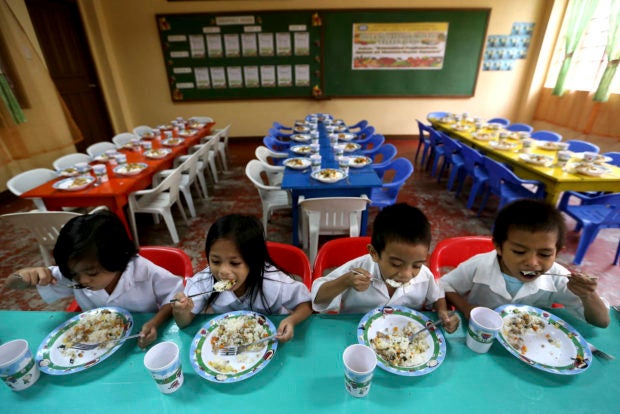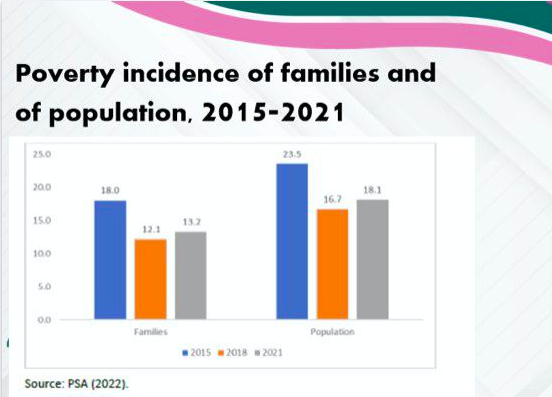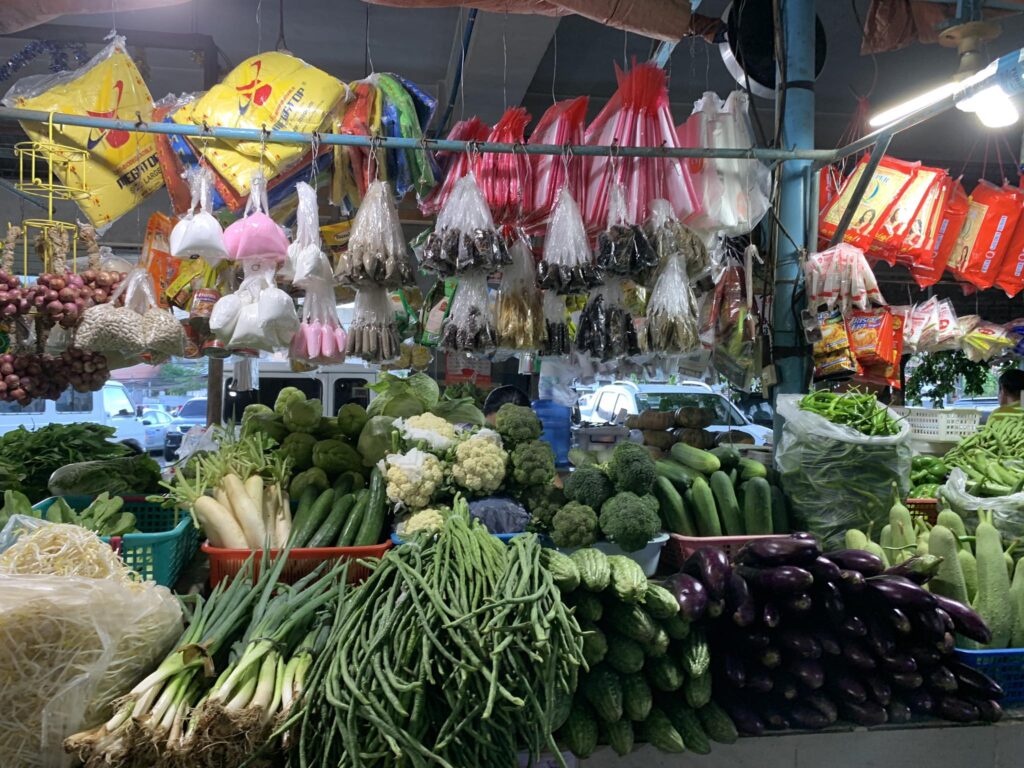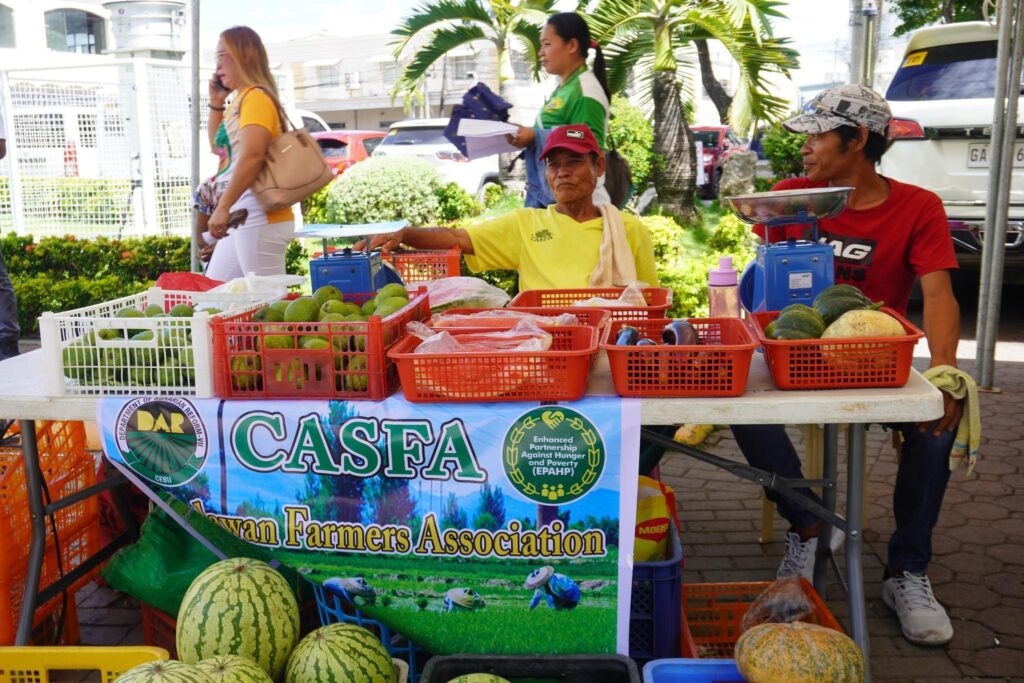Buwad, ginamos, noodles: A struggling family shows why nutrition is least of their worries
Poverty still hounds struggling families from getting nutritious food on their table

School children help themselves to free food fortified with malunggay and iodized salt during a feeding program in this 2020 photo of a school in Metro Manila. | Inquirer file photo (Lyn Rillon)
(Second of three parts)
CEBU CITY, Philippines – Food affordability is one of the factors why poor Filipino families cannot afford a healthy diet and balanced nutrition.
Food affordability refers to one’s capacity to pay a market price for food compared to the proportion of a household’s income and other expenses.
READ: NUTRITION MONTH: How is nutrition in Central Visayas?
For instance, a family of seven in Barangay Quiot, Cebu City, would choose buwad or dried fish over a kilo of meat when budgeting the P350 to P500 per day that their only working member earns for the family.

Buwad or salted dried fish, ginamos and noodles are usually the go-to food fare for families struggling to make ends meet. | CDN FILE PHOTO (Brian Ochoa)
READ: Feeding hungry kids
Buwad, ginamos, noodles, and hunger
Usahay makapalit og manok kung makatrabaho siya, baboy ana…pero og wala sad, buwad ug ginamos. Ningkamot lang mi makakaon kaon katulo sa usa ka adlaw. [Akong mga bata] walay vitamins-vitamins, mag utan ra.
In the case of Hanzel, 38, buying noodles, buwad (dried fish), and “ginamos” (salted fermented fish) could save them days from hunger rather than buying fruits and meat.
With their spending capacity, nutrition was the least of their concerns, she said.
“Usahay makapalit og manok kung makatrabaho siya, baboy ana…pero og wala sad, buwad ug ginamos. Ningkamot lang mi makakaon kaon katulo sa usa ka adlaw. [Akong mga bata] walay vitamins-vitamins, mag utan ra,” Hanzel said.
(Sometimes we can buy chicken if he can work, even pork…but if he does not have work, buwad (dried fish) and ginamos (salted fermented fish). We strive to eat three times a day. [My kids] no vitamins-vitamins for them, we just cook utan (a kind of vegetable dish).
Hanzel has seven children with her live-in partner Johndy, who works part-time as a painter of houses.
READ: Senate bill bats for comprehensive nutrition program for senior citizens
Earn a few hundreds
Meanwhile, Hanzel said she sometimes earn a few hundred pesos for working as a cement hauler for neighbors, who would commission her to haul construction materials. She gets paid P5 for each cement sack she hauls.
But not every day is like this; occasionally, neither of them receives a job request.
READ: National Nutrition Council upgrade sought
Poverty incidence
The 2022 data from the Philippine Statistics Authority ([PSA), which the Regional Nutrition Council 7 presented during the launching of the 49th Nutrition Month celebration earlier this month, showed that the poverty incidence of families in the country has slightly increased from 2018 to 2021.
The proportion of poor families was recorded at 13.2 percent in 2021 compared to the 12.1 percent in 2018.
“Nakareduce unta ta in 2018, but nibalik siya og saka pagka 2021. And the COVID pandemic has affected our income capacities, sa atong kapasidad panarbaho, kay naapektahan man sad ang tibuok business sector,” Parolita Mission, NNC-7 nutrition program coordinator, said.
(We could have reduced that in 2018, but it again increased in 2021. And the COVID pandemic has affected our income capacities, our capacity to work because all in the business sector were affected.)

Here is a graph of the poverty incidence of families and of population from 2015 to 2021. | PSA via NNC
READ: Need for separate nutrition body under President’s office questioned
Misallocate food spending
Mission, quoting a study, said that Filipinos, due to poverty, tend to misallocate food spending and that more is spent on starchy staples, meat, fish, and nuts than the dietary recommendation.
Families also “tend to underspend on vegetables, fruits, milk and meat, and too much fats and oils.”
Yet, as data have shown, most Filipinos cannot afford the cost of a nutritious diet.
Mission said food was getting more expensive due to various factors present globally. These included the increase in prices due to inflation, post-pandemic economic impacts, global warming, and the increase in the prices of basic commodities, such as fuel.
The family of Hanzel is part of the two percent or 5.3 million Filipinos who are severely food insecure.

Struggling families like that of Hanzel’s family find it difficult to consistently have vegetables on the table for their food since they could hardly afford to buy them. | Niña Mae Oliverio
READ: Doing feeding right
Feeding programs
Hanzel admitted that feeding programs in school were an advantage for her eight-year-old son, but her son was already excluded from the feeding program after finishing Grade One.
“Nagskwela na akong anak. Katong Grade 2 na, gitangtang na siya sa feeding nila ba, kay sa ilang hunahuna, bug-at na kuno ba,” she said
(My son goes to school. But when he moved to Grade 2, he was removed from their feeding program because, in their mind, my son was already heavy enough.)
“Pero dili man kaayo bug-at akong anak. Dili man kaayo siya mukaon kaayo ba. Ambot lang inig ka Grade 3 niya, apil pa ba siya og feeding sa skwelahan?,” she said when asked who among her five children were receiving food assistance at school.
(But my son’s weight is not heavy. He does not even eat much. I don’t know when he reaches Grade 3 if he will still be included in the feeding program of the school?.)
And with the celebration of the 49th Nutrition Month, the RNC and its mother agency NNC, calls on policymakers, program managers, and legislators to increase the availability of nutritious food by giving subsidies, product reformulation, and improved food value chains.
Out of her five kids, only the youngest son is enrolled in school.
But she lost two other kids to diseases — a one-year-old girl, who died of pneumonia, and another one, a boy, who died of diarrhea before he could turn one.
READ: The real cost of malnutrition
Nutrition a luxury to some
Nutrition is a luxury for some, if not, for many Filipino families, including Hanzel’s.

Farmers sell some of their produce during the launching of Nutrition Month in Cebu City early this month. | Wenilyn Sabalo
READ: 49th Nutrition Month kicks off in Cebu City, grow own foods expert says
And with the celebration of the 49th Nutrition Month, the RNC and its mother agency NNC, call on policymakers, program managers, and legislators to increase the availability of nutritious food by giving subsidies, product reformulation, and improving food value chains.
The agency also called on national legislators to redirect resources to agriculture to enable more to have access to affordable nutritious and safe food. (To be continued)
Disclaimer: The comments uploaded on this site do not necessarily represent or reflect the views of management and owner of Cebudailynews. We reserve the right to exclude comments that we deem to be inconsistent with our editorial standards.
